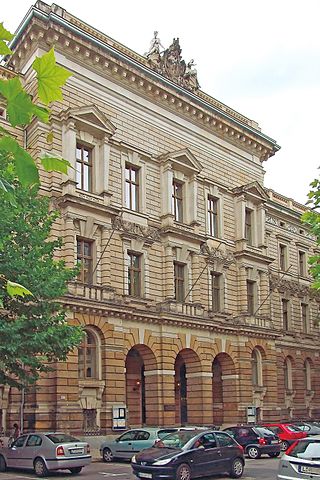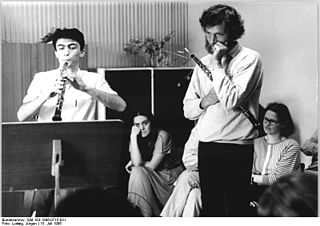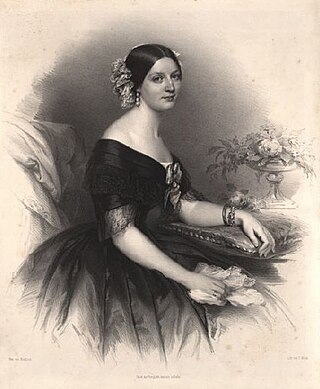
The Theaterhochschule Leipzig was a theatre school in Leipzig, Saxony, Germany, which existed from 1953 to 1992. The official name was Theaterhochschule "Hans Otto" Leipzig.

The Theaterhochschule Leipzig was a theatre school in Leipzig, Saxony, Germany, which existed from 1953 to 1992. The official name was Theaterhochschule "Hans Otto" Leipzig.
The Theaterhochschule Leipzig was founded on 1 November 1953 as a merger of two institutions, the Deutsches Theater-Institut in Weimar and the Theaterschule Leipzig. From the late 1960s, Bertolt Brecht was a teacher. In 1967 it was named after the actor Hans Otto whom the Nazis had murdered in 1933. The Hochschule was located at the Villa Sieskind in the Musikviertel and buildings in the neighbourhood.
The institution was dissolved per the Sächsisches Hochschulstrukturgesetz on 10 April 1992. The acting department became a faculty of the Hochschule für Musik und Theater "Felix Mendelssohn Bartholdy", while theatre studies formed a new institute of the Leipzig University.

The University of Music and Theatre "Felix Mendelssohn Bartholdy" Leipzig (German: Hochschule für Musik und Theater "Felix Mendelssohn Bartholdy" Leipzig) is a public university in Leipzig (Saxony, Germany). Founded in 1843 by Felix Mendelssohn as the Conservatorium der Musik (Conservatory of Music), it is the oldest university school of music in Germany.
Heinz Rögner was a German conductor. He was born in Leipzig.
Hans-Joachim Rotzsch was a German choral conductor, conducting the Thomanerchor from 1972 until 1991 as the fifteenth Thomaskantor since Johann Sebastian Bach. He was also a tenor and an academic teacher.
Christoph Genz is a German tenor in opera and concert.

Katharina Treutler is a German pianist.
Peter Bruns is a German cellist and university professor.

Burkhard Glaetzner is a German oboe virtuoso und conductor. He is one of the leading oboe players in Germany.
Werner Wolf was a German musicologist and music critic. The acknowledged Wagner researcher was co-editor of Sämtlicher Briefe of the composer from 1967 to 1979. He also presented several opera performances. In 1981 he was appointed professor at the Leipzig University.
Wulf Konold was a German musicologist, dramaturge and theatre director.
Hans Lissmann, also Hans Lißmann, was a German operatic tenor.
The Mendelssohn Scholarship, awarded by the Prussian State from 1879 to 1936, was revived in 1963 by the Prussian Cultural Heritage Foundation. The Foundation awards the Felix Mendelssohn-Bartholdy Prize once a year per competition opened to particularly talented students at one of the 23 recognised music academies in Germany.
Andreas Wilhelm is a German composer and pianist.
Johannes Piersig was a German Kantor, docent for organ playing, music education and music theory, and later in 1979/80 rector of the Free University of Hamburg.
Werner Felix was a German music historian and Bach scholar. He was rector of the Hochschule für Musik Franz Liszt, Weimar and the University of Music and Theatre Leipzig as well as president of the Chopin-Gesellschaft of the DDR.
Peter Herrmann was a German composer and academic teacher. He composed three operas and a ballet, but mainly instrumental music both for orchestra and chamber music. His works have been performed internationally; his second string quartet was awarded a prize at the Prague Spring International Music Festival. He was professor of composition at the Musikhochschule Leipzig from 1969, serving as its rector from 1984 to 1987.
Christian Kluttig is a German conductor, pianist and Hochschullehrer. From 1979 to 1990, he was chief conductor of the Orchester des Opernhauses Halle. Appointed General Music Director in 1983, he worked as such at the theatres in Halle (Saale) and Theater Koblenz. The Handel interpreter rendered special services to the implementation of Historically informed performance in the Saale city, which made him one of the most important protagonists in this field in the GDR. He also devoted himself to Neue Musik, premiering Reiner Bredemeyer's opera Candide.
Pauline Sachse is a German violist, chamber musician, and professor at the Hochschule für Musik und Theather Felix Mendelssohn Bartholdy.
Cornelia Osterwald is a German harpsichordist and docent for early music.

Michael Kann is a German film director and actor. He was born in Berlin, East Germany, on 13 January 1950.

Virginia Livia Frege, née Gerhardt was a German singer (soprano), Prima Donna of the Leipzig Stadttheater, arts patron and co-founder of the Leipzig Bach Society. She was referred to as the "Queen of Leipzig's romantic song singing". Frege is best known for her performances of the works by Felix Mendelssohn Bartholdy. Her repertoire included songs by Heinrich Marschner, Franz Schubert, Robert Schumann and Mendelssohn.